Central Asia is the region with the most vitality and potential for growth along the Silk Road Economic Belt. Increasingly close exchanges between China and Central Asian countries contribute to their deeper economic cooperation and in-depth dialogue in rule of law. Our university actively engages in “Belt and Road Initiative” (BRI)-related activities, deeply implements President Xi Jinping Thought on the Rule of Law, actively expands cooperation with law universities and legal practice institutions in Central Asia, deepens pragmatic cooperation in talent training, discipline construction, faculty, scientific research, and people-to-people exchanges, and works together to promote regional legal education exchanges and legal theory research cooperation, so as to build a closer China-Central Asia education community.
1. Build Channels and Platforms for Exchange and Cooperation
The university actively expands cooperation with higher education institutions in Central Asian countries, builds a diversified cooperation platform, continues deep friendship, promotes mutual benefit and opens a new chapter of mutual integration. The university has signed formal cooperation agreements with partners including Caspian University (Kazakhstan), International Kazakh-Chinese Language College, Kyrgyz State Law University under the Government of the Kyrgyz Republic, Tashkent State Law University of Uzbekistan to establish partnerships. As one of the founding universities of the SCO Law University Alliance, our university has jointly held academic lectures and engaged in joint training of talent with and among Central Asian universities of the alliance such as Al-Farabi Kazakh National University, Tashkent State Law University and Kyrgyz National University.
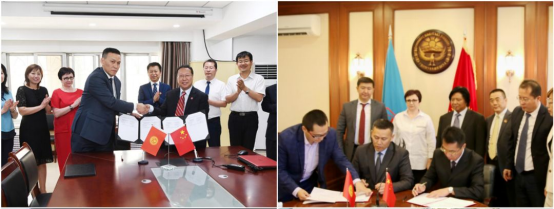
Left: Delegation led by Rector Rysmendeev Baktybek of the Kyrgyz State Law University visited our university and signed cooperation agreement
Right: Delegation led by Vice President Zhang Junzheng visited the Kyrgyz State Law University and signed cooperation agreement
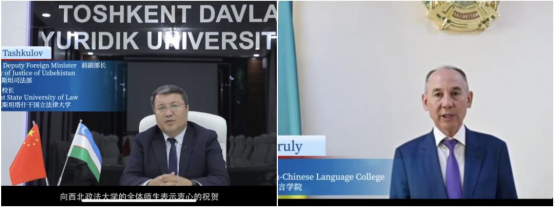
Left: Akbar Tashkulov, former Deputy Minister of Justice of Uzbekistan and President of the Tashkent State Law University of Uzbekistan, congratulates the university on the 85th anniversary
Right: Talgat Mamyruly, President of International Kazakh-Chinese Language College, congratulates our university on the 85th anniversary
2. Deepen Exchanges and Cooperation in Legal Education through Mutual Learning
In light of the philosophy of openness, inclusiveness, mutual benefit and win-win cooperation, our university actively promotes academic exchanges with universities in Central Asian countries. In recent years, our university has invited more than 40 experts and scholars from 20 groups of Central Asian countries for exchanges or short-term training, held 10 featured lectures, hosted 4 international conferences; several teachers of our university were also invited to give lectures at our partner universities. Experienced legal experts and practitioners from Kazakhstan, Uzbekistan, Kyrgyzstan, Tajikistan and other countries were invited to exchange ideas over relevant legal issues.
The university has sent delegations to Tashkent State Law University in Uzbekistan, Kyrgyz State Law University, Al-Farabi Kazakh National University, and Caspian University (Kazakhstan) and agreed on collaboration in research, international conferences, joint training of talent and other aspects.
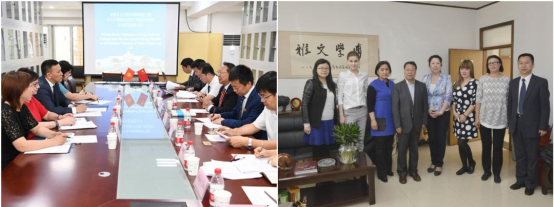
Left: The President of the Kyrgyz State Law University visited our university
Right: Short-term study group from Caspian University of Kazakhstan visited our university
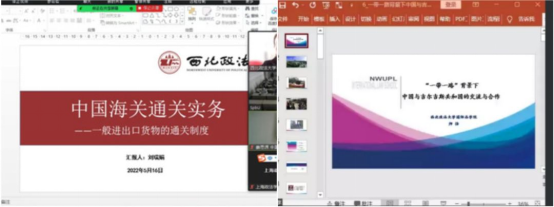
Left: Liu Ruijuan, a teacher of our university, was invited to lecture on “China Customs Clearance Practice” for teachers and students from universities of the SCO Law University Alliance
Right: Shi Yi, a teacher of our university, was invited to lecture on “Exchange and Cooperation between China and the Kyrgyz Republic under the BRI” for state-run universities of the Kyrgyz Republic
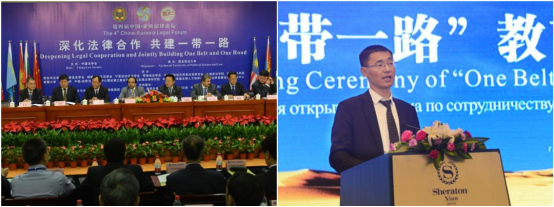
Left: Central Asian legal experts attended the “4th China-Eurasia Legal Forum” held by our university
Right: Professor Kanyazov, Deputy Minister of Justice of Uzbekistan and President of Tashkent State Law University, delivered a keynote speech at the “Belt & Road” Legal Forum on Cooperation and Development hosted by our university
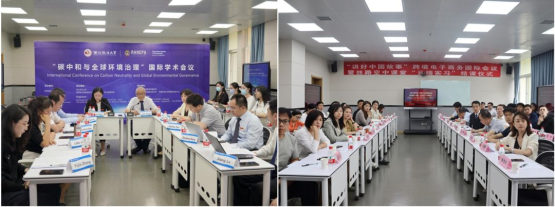
Left: Our university co-organized the International Conference on Carbon Neutrality and Global Environmental Governance with legal experts from Kyrgyzstan and other countries
Right: Our university co-organized the “Tell China’s Story” Cross-Border E-commerce International Conference with universities in Kazakhstan and other countries
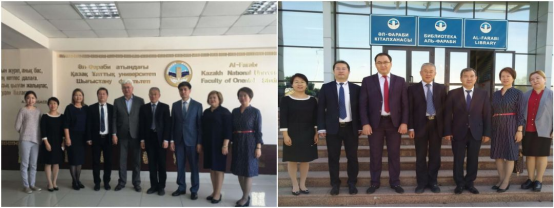
Left: Vice President Wang Jian and his entourage visit Al-Farabi Kazakh National University
Right: Vice President Wang Jian and his entourage visit Caspian University in Kazakhstan
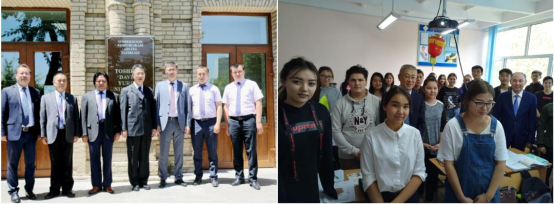
Left: Vice President Zhang Junzheng with delegates from our university visited Tashkent State Law University in Uzbekistan
Right: Vice President Wang Jian with delegates from our university visited International Kazakh-Chinese Language College
3. Promote China-Central Asia Legal Theory Research with Our Strengths in Legal Discipline
Our university gives full play to our strengths in legal discipline to promote the study of China-Central Asia legal theory. The international law team from our university collected more than 30 laws of the Kyrgyz Republic, including its Intellectual Property Protection Law and the Investment Law, and compiled country-specific legal research reports with over 100,000 words, providing Chinese enterprises with highly operational risk prevention and control guidelines in land, finance, intellectual property protection and other businesses in Kyrgyzstan. With a special focus on country-specific legal research, cross-cultural study, outbound investment of Chinese enterprises, and Chinese film dissemination, scholars of our university have published papers including “The History and Current Situation of the Dissemination of Chinese Films in Central Asia”, “Redefining ‘Investment’ in BIT in China and Central Asian Countries”, etc, and books such as “Legal Research on BRI Countries (Kyrgyzstan)”, “Research on Labor Code of the Republic of Kazakhstan”, and “Cross-cultural Communication of Chinese Films in Central Asia”.
Our university actively engages in legal research in Central Asia with “Center for Central and South Asian Studies” approved by the Ministry of Education in 2017, and the foreign assistance project for education “Research on International Cooperation on Counter-Terrorism within the SCO Framework – Taking Kyrgyzstan as a Case Study” approved in 2018. The Center for Central and South Asian Studies has established collaboration with Central Asian universities, carried out a series of research projects, published more than 100 academic papers in top journals and more than 10 books at home and abroad. The research team of the “Foreign Assistance Project” has made several rounds of field research in Kyrgyzstan for data collection, published monographs including “Research on International Cooperation against Terrorism within the Framework of the Shanghai Cooperation Organization” and academic papers such as “Research on the Legal Challenges in Anti-Terrorism Cooperation in Central Asia under the SCO Framework”, and provided relevant authorities with intellectual support.
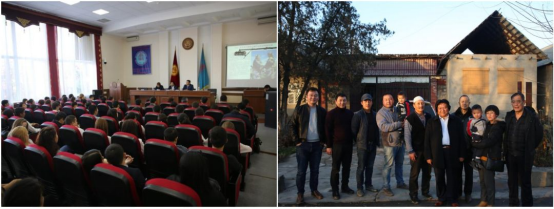
Left: Professor Mu Xingtian gave a featured report to the teachers and students of Kyrgyz State Law University
Right: Foreign Assistance Team (Education) visited villages inhabited by Dungans and Uyghurs in Kyrgyzstan
4. Provide Quality Education for International Students
Since 2017, our university has enrolled 133 international students from Central Asian countries with increasingly optimized academic programs respectively for undergraduates, graduate students and doctoral candidates, launching projects including joint academic training and Chinese language training, constantly reforming education and teaching, and optimized programs in legal science, e-commerce and law, international economy and trade, international business and other specialties for international students. Now, our university provides 24 courses taught in English, expecting to fostering quality short-term culture learning projects featured with international law and international trade law courses. To promote the popularity and quality of education for international students, students from BRI countries, especially those from Central Asian countries, are entitled to scholarship provided by our university, Xi’an Municipal Government and Shaanxi Provincial Government, and are given the chance to know a reliable, admirable, and respectable China through courses on China’s social life, traditional culture, and natural landscape.
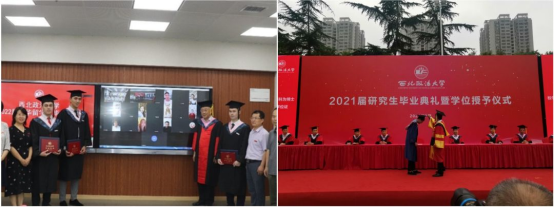
Left: The online and on-campus graduation ceremony for Central Asian international students of class 2022
Right: Turkmenistan students of class 2021 attend the degree awarding ceremony for graduates
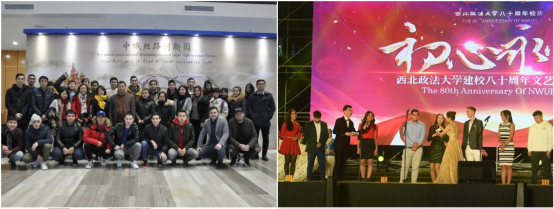
Left: Central Asian students visit the Sino-Russia Silk Road High-tech Innovation Park
Right: Central Asian students attend the 80th anniversary gala of NWUPL
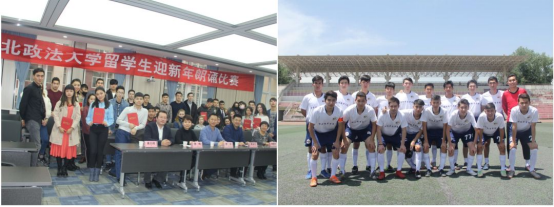
Left: Central Asian students participate in the New Year Recitation Competition
Right: Central Asian students participate in NWUPL Soccer Game
5. Build a Closer China-Central Asia Education Community through Increased and Enhanced People-To-People Exchanges
In July 2020, the university officially launched an international e-commerce education project “Silk Road Air Class”, the first of its kind in Northwest China, mainly for students from countries along the Silk Road. The project has benefited over 200 students in Kazakhstan and other cooperative universities with lectures of nearly 80 hours and practices through “cloud internship”. Our university was approved to provide short-term courses on Chinese language and culture under the “Chinese Bridge” Online Group Exchange Program respectively in 2021 and 2022 for students from countries along the Silk Road. The project includes three modules: language, traditional Chinese culture, contemporary China and Xi'an, with nearly 200 students from Central Asia participating in the study to appreciate the colorful traditional Chinese culture and to learn Chinese language and understand Chinese culture.
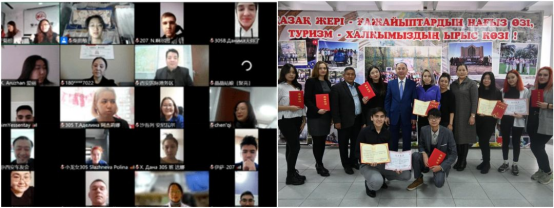
Left: Screenshot of Central Asian students taking “Silk Road Air Class”
Right: Kazakh students complete the “Silk Road Air Class”
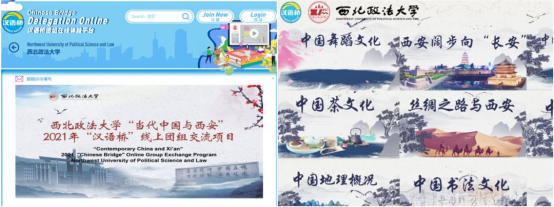
Left: The platform of NWUPL on “Chinese Bridge” Online Group Exchange Program official website
Right: Recorded courses of the “Chinese Bridge” Online Group Exchange Program
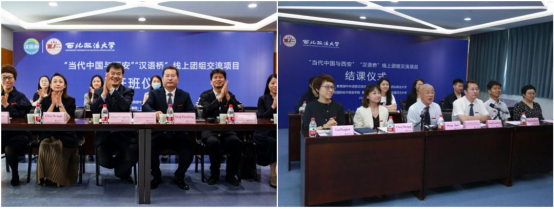
Left: Opening ceremony of the “Contemporary China and Xi'an” under the Chinese Bridge Online Group Exchange Program
Right: Closing ceremony of the “Contemporary China and Xi'an” under the Chinese Bridge Online Group Exchange Program
As the saying goes, when your heart knows its direction, the distance to destination will never be long. As the China-Central Asia Summit provides a richer platform and space for educational exchanges and cooperation between China and Central Asian countries, NWUPL will continue to uphold the Silk Road spirit, build an open and shared educational exchange platform between China and Central Asia, promote the construction of a closer legal education community, write more new chapters of mutual respect, common support, mutual benefit and win-win results, working together towards a better future.